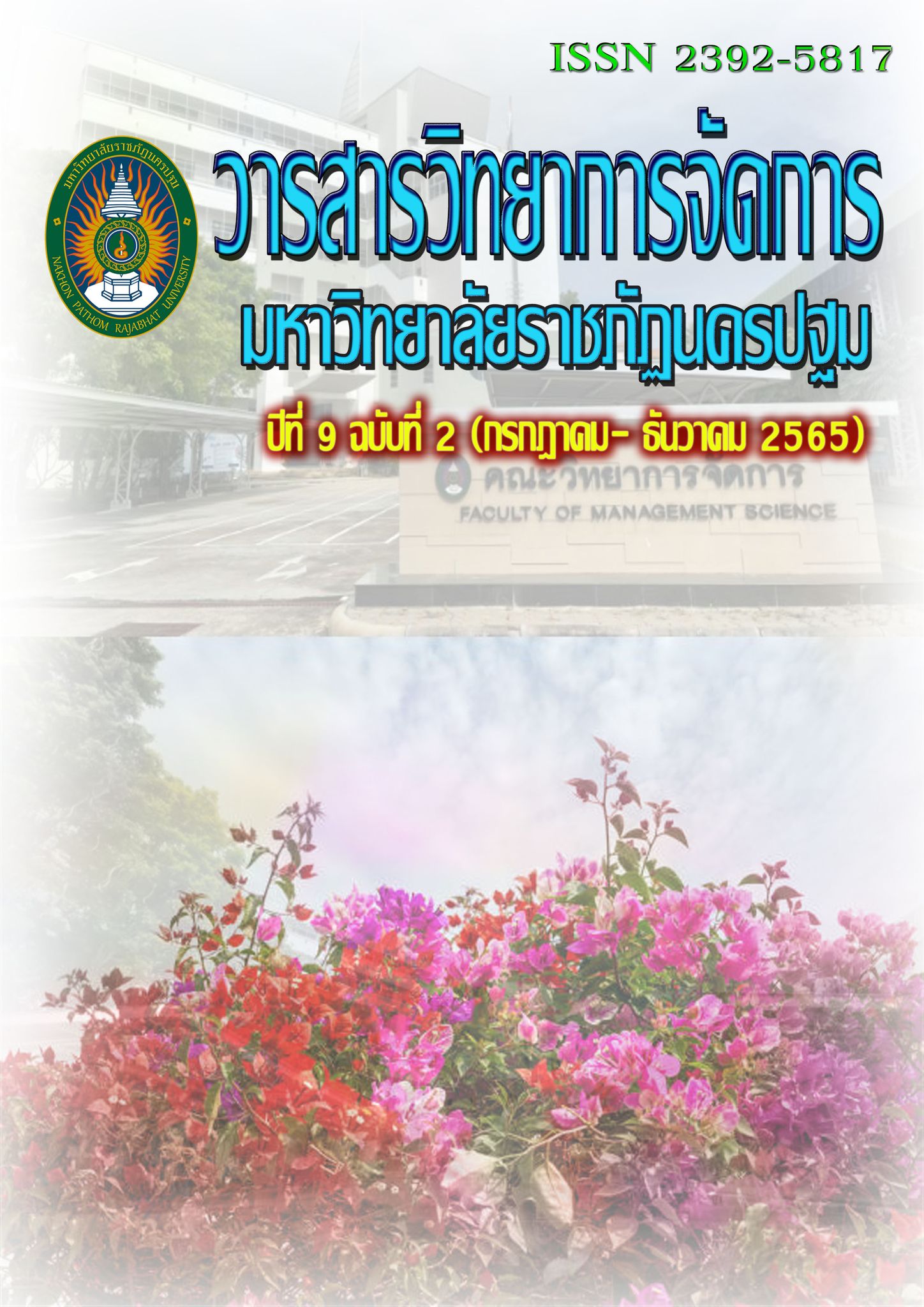The correlation between the transformational leadership and ICT operational for secondary school in kanchanaburi and ratchaburi
Main Article Content
Abstract
The objectives of this research were: 1) to study transformational leadership for secondary school in kanchanaburi and ratchaburi, 2) to study ICT operational for secondary school in kanchanaburi and ratchaburi, and 3) to study the relationship between transformational leadership and ICT operational for secondary school in kanchanaburi and ratchaburi. The sample were 48 schools for secondary school in kanchanaburi and ratchaburi. The 3 respondents in each school were; directors deputies and teacher in the secondary schools. There were 144 respondents.
The research instrument was a questionnaire about transformational leadership based on Bass and Avolio concept and using information communication and technology. The statistics used in data analyzing were Percentage, Mean, Standard Deviation and Pearson’s Correlation. The research finding revealed as follows: the transformational leadership was found correlated with the ICT operational for secondary school in kanchanaburi and ratchaburi at .01 level of significance.
Article history: Received 20 January 2022
Revised 2 May 2022
Accepted 5 May 2022
SIMILARITY INDEX = 6.94 %
Article Details

This work is licensed under a Creative Commons Attribution-NonCommercial-NoDerivatives 4.0 International License.
The views and opinions of the article appearing in this journal are those of the author. It is not considered a view and responsibility of the editorial staff.
References
กระทรวงศึกษาธิการ. (2561). แนวทางการขับเคลื่อน พื้นที่นวัตกรรมการศึกษา จังหวัดกาญจนบุรี, [ออนไลน์]. ค้นเมื่อ 6 มกราคม 2565, จาก http://shorturl.at/mqvxB
กระทรวงศึกษาธิการ. (2564). การกำหนดและแก้ไขเปลี่ยนแปลงเขตพื้นที่การศึกษามัธยมศึกษา, [ออนไลน์]. ค้นเมื่อ 6 มกราคม 2565,จากhttp://www.ratchakitcha.soc.go.th/DATA/PDF/2564/E/038/T_0004.PDF
ดาวประดับ เรืองศิริ สาโรจน์ เผ่าวงศากุล และ นิพนธ์ วรรณเวช. (2564). การบริหารเทคโนโลยีสารสนเทศและการสื่อสารในสถานศึกษาขั้นพื้นฐาน สังกัดสำนักงานเขตพื้นที่การศึกษามัธยมศึกษากาญจนบุรีและราชบุรี. วารสารสหวิทยาการมนุษยศาสตร์และสังคมศาสตร์. 4(3). 1105-1112.
ธัญลักษณ์ โพธิ์ช่วย. (2562). ภาวะผู้นำการเปลี่ยนแปลงกับคุณภาพชีวิตในการทำงานของครู. วารสารการบริหารการศึกษา มหาวิทยาลัยศิลปากร. 10(1). 407-420.
นงลักษณ์ ศิริฟัก. (2561). ภาวะผู้นำการเปลี่ยนแปลงของผู้บริหารกับการใช้เทคโนโลยีสารสนเทศและการสื่อสารในสถานศึกษาระดับมัธยมศึกษา จังหวัดกาญจนบุรี. วิทยานิพนธ์ศึกษาศาสตรมหาบัณฑิต สาขาการบริหารการศึกษา บัณฑิตวิทยาลัย มหาวิทยาลัยศิลปากร.
นภัสนันท์ เบิกสีใส. (2557). ความสัมพันธ์ระหว่างภาวะผู้นำการเปลี่ยนแปลงสถานศึกษากับการดำเนินงานตามมาตรฐานเทคโนโลยีสารสนเทศและการสื่อสารเพื่อการศึกษา สังกัดสำนักงานเขตพื้นที่การศึกษามัธยมศึกษาสกลนคร เขต 23. วิทยานิพนธ์ศึกษาศาสตรมหาบัณฑิต คณะครุศาสตร์อุตสาหกรรม สาขาวิชาเทคโนโลยีการบริหารการศึกษา มหาวิทยาลัยมหาวิทยาลัยเทคโนโลยีราชมงคลธัญบุรี.
ยืน ภู่วรวรรณ สมชาย นำประเสริฐชัย. (2546). ไอซีทีเพื่อการศึกษาไทย. กรุงเทพฯ: ซีเอ็ยูเคชั่น.
รัตติกรณ์ จงวิศาล. (2543). ผลการฝึกอบรมภาวะผู้นำการเปลี่ยนแปลงของผู้นำนิสิตมหาวิทยาลัยเกษตรศาสตร์. ปริญญานิพนธ์ สาขาวิชาพฤติกรรมศาสตร์ บัณฑิตวิทยาลัย มหาวิทยาลัยศรีนครินทรวิโรฒ.
ศิวพร ไตรภพ และ นพดล พันธุ์พานิช. (2562). การพัฒนาภาวะผู้นำการเปลี่ยนแปลงที่มีอิทธิพลต่อความสามารถทางการบัญชีที่มีต่อความสำเร็จของธุรกิจโลจิสติกส์ในประเทศไทย. วารสารสันติศึกษาปริทรรศน์. 7(6). 1755–1767.
สัมฤทธิ์ กางเพ็ง และประยุทธ ชูสอน. (2557). ภาวะผู้นำแบบโลกาภิวัฒน์: แนวคิดและการวิจัย Global Leadership: Concept and Research. ขอนแก่น: โรงพิมพ์คลังนานาวิทยา.
สำนักงานศึกษาธิการจังหวัดกาญจนบุรี. (2560). แผนพัฒนาการศึกษาจังหวัดกาญจนบุรี 4 ปี (พ.ศ.2562 -2565), ค้นเมื่อ 6 มกราคม 2565,. shorturl.at/jswIU
สุรินทร์ รัตนศิธร. (2557). กลยุทธ์การบริหารเทคโนโลยีสารสนเทศอย่างมีประสิทธิผลสำหรับโรงเรียนขยายโอกาสทางการศึกษาสังกัดสำนักงานเขตพื้นที่มัธยมศึกษา. วิทยานิพนธ์ศึกษาศาตรมหาบัณฑิต บัณฑิตวิทยาลัย มหาวิทยาลัยเกริก.
อนันต์ โพธิกุล. (2562). ภาวะผู้นำการเปลี่ยนแปลงของผู้บริหารที่มีอิทธิพลต่อความสำเร็จของการใช้เทคโนโลยีสารสนเทศในสำนักงานเขตทวีวัฒนา กรุงเทพมหานคร. วารสารวิทยาการจัดการ มหาวิทยาลัยราชภัฎนครปฐม. 6(2). 297–309.
อนันต์ โพธิกุล. (2562). ภาวะผู้นำการเปลี่ยนแปลงของผู้บริหารที่มีอิทธิพลต่อความสำเร็จของการใช้เทคโนโลยีสารสนเทศในสำนักงานเขตหนองแขม กรุงเทพมหานคร. วารสารวิทยาการจัดการ มหาวิทยาลัยราชภัฎนครปฐม. 6(1). 285–298.
Bass, B. M., & Avolio, B. J. (1989). Potential biases in leadership measures: How prototypes, leniency, and general satisfaction relate to ratings and rankings of transformational and transactional leadership constructs. Educational and Psychological Measurement. 49(3). 509–527.
Bass, Bernard M. (1985). Leadership and Performance Beyond Expectations. New York: Free Press, New York: Collier Macmillan.
Burns, James M. (1978). Leadership. 1st ed. New York: Harper & Row.
Eyal, Ori, and Ronit Kark. (2004). How Do Transformational Leaders Transform Organizations? A Study of the Relationship Between Leadership and Entrepreneurship. Leadership and Policy in Schools. 3(3). 211–235.
Hill, N. Sharon, Myeong-Gu Seo, Jae Hyeung Kang, and M. Susan Taylor. (2012). Building employee commitment to change across organizational levels: The influence of hierarchical distance and direct managers’ transformational leadership. Organization Science. 23(3). 758–777.
Krejcie, R.V. and Morgan, D.W. (1970). Determining Sample Size for Research Activities. Educational and Psychological Measurement. 30. 607-610.
Likert, R. (1932). A technique for the measurement of attitudes. Archives of Psychology. 22(140). 55.
Puffer, Sheila M., and Daniel J. McCarthy. (2008). Ethical turnarounds and transformational leadership: A global imperative for corporate social responsibility. Thunderbird International Business Review. 50(5). 303–314.
Yang, Chung-Wen. (2008). The Relationships Among Leadership Styles, Entrepreneurial Orientation, and Business Performance. Managing Global Transitions. 6. 257-275.

